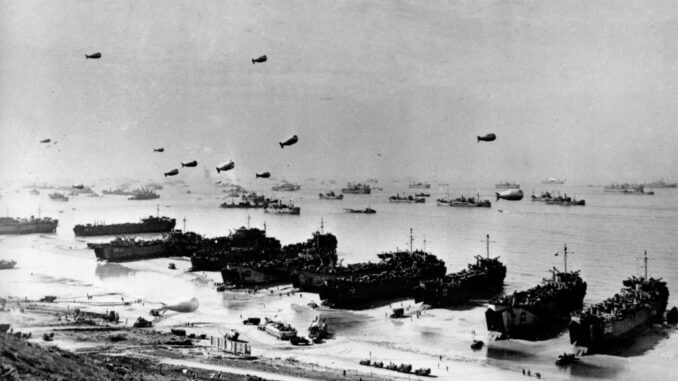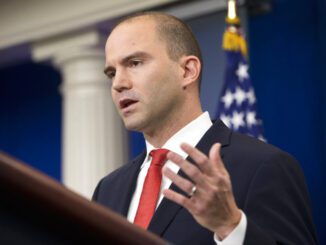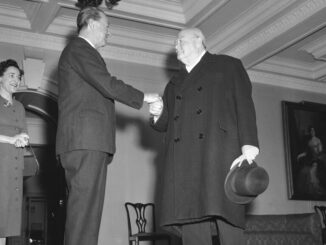
Just when I thought that toxic anti-Americanism had peaked, a CUNY law school graduate makes headlines urging her classmates to overthrow our government, assuring them that “greater empires of destruction have fallen.”
Watching the video of Fatima Mohammed’s commencement address, I bristled when she named our “fascist” military among her enemies. As the daughter of a soldier who served in World War II and the niece of three others who survived close calls, I shall challenge Ms. Mohammed with an account of the role my family played in defeating two real-life empires of destruction.
My dad’s first close call came on June 6, 1944, while he was assigned to a flotilla that was harbored in the English Channel in preparation for the invasion of France. Dad’s Landing Craft Tank was not slated to cross the Channel on D-Day, but he had planned to go along on another ship before deciding not to take an unnecessary risk. As it turned out, that ship was the only ship in Dad’s flotilla that struck a mine, killing everyone aboard.
Following the Normandy invasion, Dad became the executive officer on a Landing Ship Tank that sailed to San Pedro, California, where its crew took on a cargo of 1,400 tons of ammunition before joining a convoy headed for the battle zone in Okinawa.
By day, Dad’s ship supplied ammunition to the cruisers and destroyers that lobbed shells into the Japanese positions. By night they were anchored in what they thought was a safe harbor.
From that “safe” harbor Dad watched a Kamikaze pilot crash into the side of a troop transport a hundred yards away, then watched a second Kamikaze crash into a ship about a mile from the entrance to their anchorage, killing everyone aboard. If either of those pilots had hit the cargo of LST 970, they would have blown up every ship in the harbor.
After Okinawa was secured on June 22, 1945, Dad’s outfit sailed to the Philippines where they prepared for the invasion of Japan. Fearful that invading Japan would be, in President Truman’s words, “Okinawa from one end of Japan to the other,” on Aug. 6, he ordered Col. Paul Tibbets to drop “Little Boy” over Hiroshima and on Aug. 9, ordered Capt. Frederick Bock to drop “Fat Man” over Nagasaki.
Hearing about the success of those missions, Truman simply said, “We won the gamble,” and on Aug. 14, 1945, Japan surrendered.
While Dad was spared the D-Day melee, his brother Herman was assigned to an Army Engineers division that landed in the first wave of troops on Utah Beach. I say landed, but the LCVP that carried Uncle Herman had no landing ramp, so he had to disembark in 4 feet of water — carrying a backpack that contained the typewriter he used in his work as a map-keeper. Herman jettisoned that typewriter and grabbed a rifle on the beach to replace the one he’d lost coming ashore. He never knew the name of the dead soldier whose rifle he snatched, but Herman fought using that rifle until V-E Day on May 9, 1945.
Uncle Harry was only 18 when he enlisted in the Army and became a waist gunner on a B-24 Liberator, which flew missions over the Adriatic Sea to German-occupied Yugoslavia. On his 19th mission, his plane was shot down, forcing his crew to bail out over central Italy. Harry was badly injured when he landed but was picked up by Italian partisans who returned him to the Allied Forces that got him to a hospital where he slowly recovered. That’s all I know about Herman and Harry’s close calls because neither talked about the carnage he had witnessed while serving overseas.
Nor did my Aunt Alice talk about her stint serving as an Army nurse anesthetist, so everything I know about the years she was stationed in Fiji I learned from my mother. Alice’s work involved anesthetizing soldiers for surgeries that were sometimes performed in tents, accompanying pilots into the war zone to pick up wounded soldiers, and keeping those soldiers alive on the flight back to Fiji.
When Japan surrendered in August 1945, all four soldiers were released early, but the hard left still condemns Truman’s decision to end the war swiftly. From their safe perch in academe or writing for leftist publications, they still liken us to the “beasts” that ran the Nazi death camps, and I’m betting that CUNY’s Class of ’23 is among them.
Before Ms. Mohammed’s address lapsed into diatribe, she recognized family members who had supported the Class of ’23, saying, “We wouldn’t be here without you.”
No, Ms. Mohammed, you wouldn’t be here without the sacrifices Americans have made to preserve your right to spew venom — with impunity — at a law school graduation.
Nan Miller lives in Raleigh.



